AWS Certification Training
- 181k Enrolled Learners
- Weekend/Weekday
- Live Class
I hope you have gone through my What is Google Cloud Platform blog, where I’ve given a detailed introduction to GCP and How to create a free GCP Account. In this blog, I’ll be talking about all the Google Cloud Services.
Google Cloud Services is a set of Computing, Networking, Storage, Big Data, Machine Learning and Management services provided by Google that runs on the same Cloud infrastructure that Google uses internally for its end-user products, such as Google Search, Gmail, Google Photos and YouTube. It offers a wide variety of Services at some pretty awesome price. You can learn more from the Google cloud certification.
Google offers a Wide Range of services from basic Cloud Services like Containers, Compute Engine to Complex Services like Machine Learning as well as Diverse IOT Services. So, let’s understand each of these services one by one.
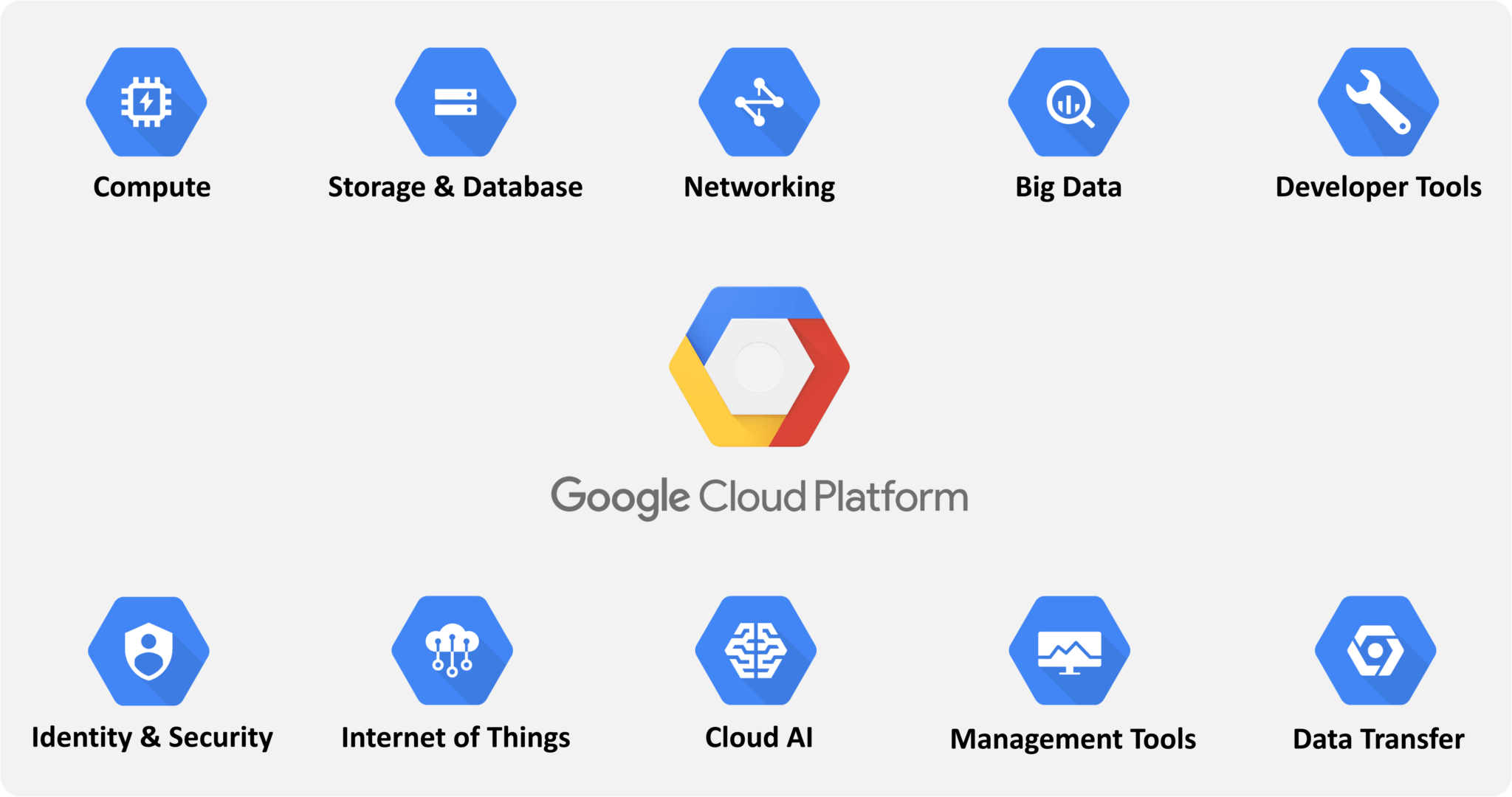
Google Cloud Platform provides a scalable range of computing options. It provides highly customizable virtual machines you can tailor to match your needs and options to deploy your code directly or via containers.
Now to create a Compute Engine Instance you can refer to this Google Cloud Platform Tutorial Blog.
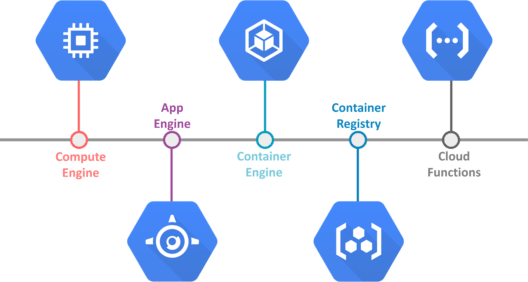
Google Compute Engine: It delivers virtual machines running in Google’s innovative data centres and worldwide fibre network. Compute Engine VMs boot quickly, they come with high-performance persistent and local disk options and deliver consistent performance.
Google App Engine: The App Engine serves as a platform used for building scalable web applications and IoT backends. App Engine scales applications automatically depending upon the traffic received. It provides you with built-in services and APIs, such as Datastores, NoSQL, Memcache, and a user authentication API, common to most applications.
Google Kubernetes Engine: It is a powerful Cluster Manager and balanced system for running your Docker containers. Kubernetes Engine schedules your containers into the cluster, keeps them healthy and manages them automatically based on requirements you define.
Google Cloud Container Registry: It is a private Docker repository that works with popular continuous delivery systems.
Networking is one of the most important as well as one of the basics of Google Cloud Platform Services offered by state of the art Networking Services.
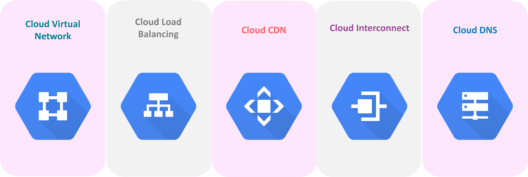
Cloud Virtual Network: You can connect various GCP resources to each other using the Google-owned global network, and isolate them from one another by using their Virtual Private Cloud (VPC) Network.
Unlock the power of the cloud with our comprehensive Cloud Computing Course.
Let’s see how we can create a VPC Network.
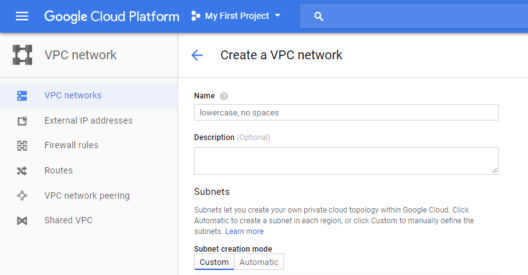
Custom Mode:
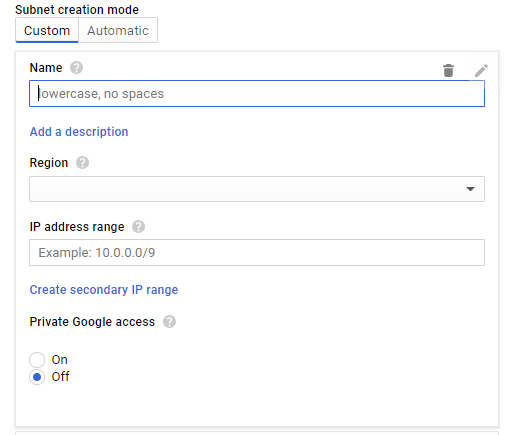
Automatic Mode:
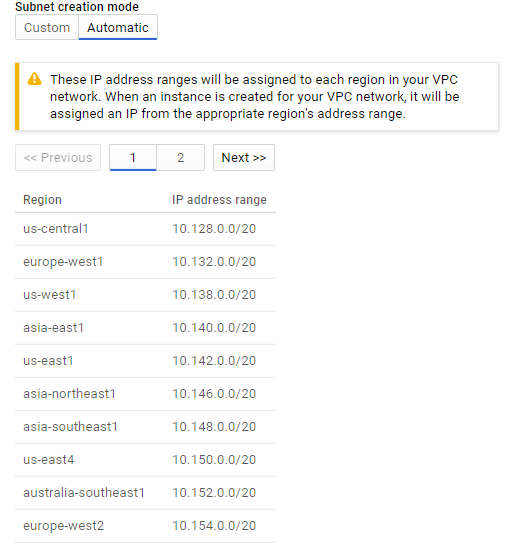
Firewall Rules:
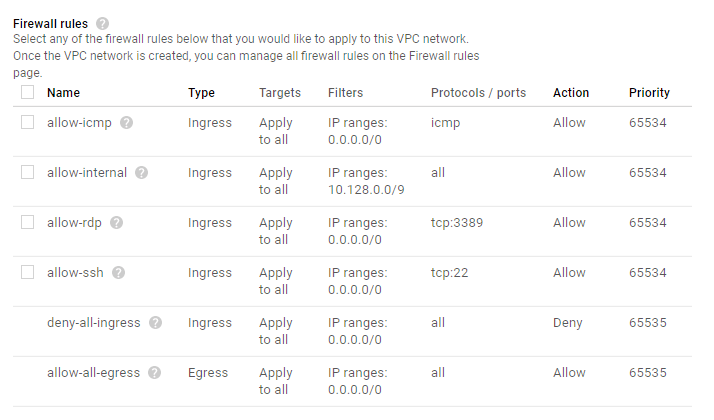
Step 3: Next you need to select the Routing Mode, which can be either Regional or Global depending on your requirement. Just Tap on the create button and within minutes your Network will be up and running.
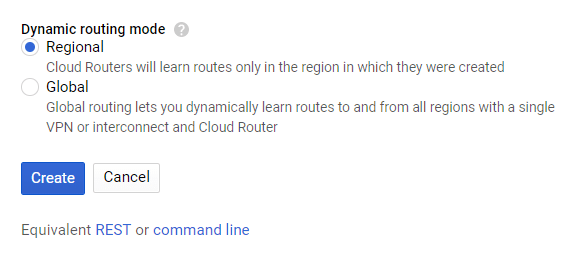
Coming back to the Google Cloud Networking Services, we have:
Google Cloud Load Balancing: It helps you Scale your applications according to your needs. Balance your load of Compute machines resources in single or multiple regions, close to your users and to meet your high availability requirements.
Cloud CDN (Content Delivery Network): It uses Google’s globally distributed edge caches to accelerate content delivery for websites and applications served out of Google Compute Engine. Cloud CDN lowers network latency, offloads origins, and reduces serving costs.
Google Cloud Interconnect: Cloud Interconnect allows Cloud platform customers to connect to Google via enterprise-grade connections with higher availability and/or lower latency than their existing Internet connections.
Google Cloud DNS: It is a scalable, reliable and managed authoritative Domain Naming System (DNS) service running on the same infrastructure as Google. It has low latency, high availability and is a cost-effective way to make your application and services available to your users.

Google Cloud Storage: It offers a unified offering across the Google Spectrum. It can handle both live data as well as Cloud archival solutions.
Cloud SQL: Cloud SQL is a fully-managed database service that makes it easy to Set up, Maintain, Manage, and Administer your relational MySQL and PostgreSQL databases in the cloud.
Cloud Bigtable: It provides a massively scalable NoSQL database suitable for low-latency and high-throughput workloads. It integrates easily with popular Big Data tools like Hadoop and Spark and it supports the open-source, industry-standard HBase API.
Google Cloud Datastore: Cloud Datastore gives you an elastic, highly available document-oriented database as a service.
Persistent Disk: It is a high-performance block storage service suitable for Virtual Machines and container storage. It offers unmatched price to performance ratio.
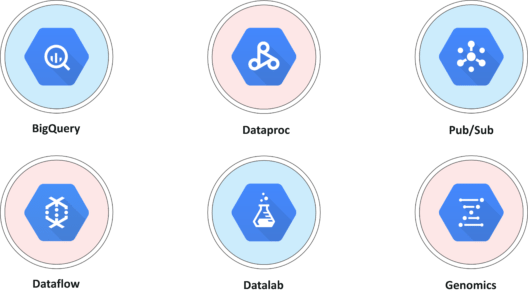
Google BigQuery: BigQuery is Google’s fully managed, low-cost analytics data warehouse.
Google Cloud Dataproc: It is a managed Spark and Hadoop service, and is used to easily process big datasets using the powerful and open tools in the Apache big data ecosystem.
Google Cloud Datalab: Cloud Datalab is an interactive notebook (based on Jupyter) to explore, collaborate, analyze and visualize data. It is integrated with BigQuery and Google Cloud Machine Learning to give you easy access to key data processing services.
Google Cloud Pub/Sub: It is a serverless, large-scale, reliable, real-time messaging service that allows you to send and receive messages between independent applications.
Now Moving ahead with our Google Cloud Services Blog, we have Machine Learning and certain Identity & Security Services along with certain Management and Development Tools.
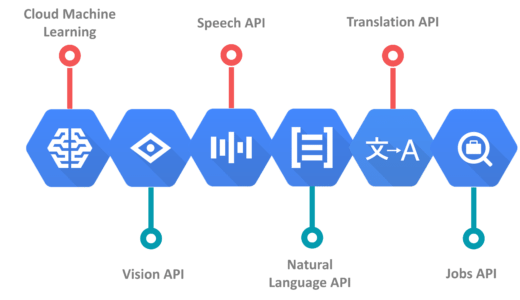
Cloud AutoML: It is a suite of Machine Learning products that enables developers with limited machine learning expertise to train high-quality models by leveraging Google’s Neural Architecture Search technology.
Google Cloud TPU: The Cloud TPUs are a family of hardware accelerators that Google designed and optimized specifically to speed up and scale up ML workloads for training and inference programmed with TensorFlow.
Google Cloud Machine Learning Engine: The ML Engine makes it easy for you to build sophisticated, large-scale machine learning models that cover a broad set of scenarios from building sophisticated regression models to image classification.
Identity and Security fall under one of the most important lists of Google Cloud Services, knowing that your data is safe and is encrypted.
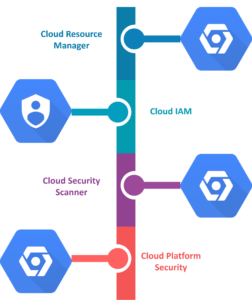
Google Cloud Identity & Access Management: The IAM lets administrators authorize who can take action on specific resources, giving you full control and visibility to manage cloud resources centrally.
Cloud Security Scanner: It is a web security scanner for common vulnerabilities in App Engine applications, including cross-site-scripting (XSS), Flash injection, mixed content (HTTP in HTTPS), and insecure libraries.
Find out our Google Cloud Training in Top Cities/Countries
| India | USA | Other Cities/Countries |
| Bangalore | New York | UK |
| Hyderabad | Chicago | London |
| Pune | Dallas | Canada |
| Chennai | Houston | Australia |
Moving on to our final set of Google Cloud Services, we have certain management tools. These tools are used to Monitor the Services, Find Errors, Debug them and Trace the Services.
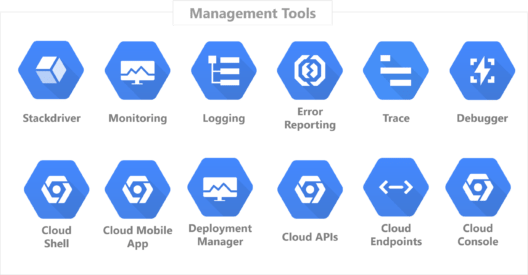
The Stackdriver delivers real-time monitoring and logging across GCP, plus useful diagnostic tools.

Google Cloud Platform provides a collection of tools and libraries that help you develop quicker.
Google Cloud SDK is a set of libraries and tools that you can use to manage computing resources and applications hosted on Google Cloud Platform. With the Cloud SDK, you have interactive command line tools to manage your virtual machines, your Cloud SQL instances and your deployments.
Find out our Cloud Architect Training in Top Cities
| India |
| Bangalore |
| Hyderabad |
| Pune |
| Mumbai |
| Delhi |
Check out our Azure Cloud Course to learn more about cloud today!
So this is it, guys!
I hope you enjoyed this Google Cloud Services blog. If you are reading this, Congratulations! You are no longer a newbie to the various Cloud Services offered by Google.
Now that you have understood What are the various Google Cloud Services, check out the GCP Certification Training by Edureka, a trusted online learning company with a network of more than 250,000 satisfied learners spread across the globe. The Edureka Google Cloud Architect Masters Program is designed to help you pass the Professional Cloud Architect Exam.
 Thank you for registering Join Edureka Meetup community for 100+ Free Webinars each month JOIN MEETUP GROUP
Thank you for registering Join Edureka Meetup community for 100+ Free Webinars each month JOIN MEETUP GROUPedureka.co